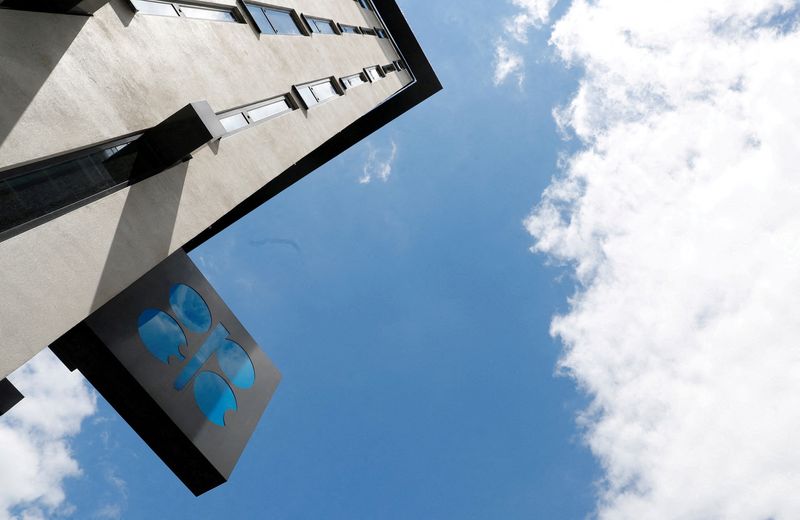By Ahmad Ghaddar, Alex Lawler and Maha El Dahan
LONDON/DUBAI (Reuters) -OPEC+ agreed on Sunday to extend the bulk of its deep oil production cuts well into 2025, as the group tries to strengthen the market amid tepid demand growth, high interest rates and rising rival American production.
Prices have traded around $80 a barrel in recent days, below what many OPEC+ members need to balance their budgets. Concerns about slow demand growth in top oil importer China have weighed on prices alongside rising oil inventories in developed economies.
The Organization of the Petroleum Exporting Countries and allies led by Russia, together known as OPEC+, have implemented a series of deep production cuts since late 2022.
OPEC+ members are currently cutting production by a total of 5.86 million barrels per day (bpd), or about 5.7% of global demand.
These include 3.66 million barrels per day of cuts, set to expire at the end of 2024, and voluntary cuts by eight members of 2.2 million barrels per day, set to expire at the end of June 2024.
On Sunday, OPEC+ agreed to extend cuts of 3.66 million barrels per day for a year to the end of 2025 and to extend cuts of 2.2 million barrels per day for three months to the end of September 2024.
OPEC+ will gradually phase out cuts of 2.2 million barrels per day over the course of a year, from October 2024 to September 2025.
“We are waiting for a drop in interest rates and a better trajectory in terms of economic growth … and not here and there in growth spots,” Saudi Energy Minister Prince Abdulaziz bin Salman told reporters.
OPEC expects demand for OPEC+ crude oil to average 43.65 million barrels per day in the second half of 2024, implying a stock decline of 2.63 million barrels per day if the group maintains production at April levels maintains 41.02 million barrels per day.
The decline will be less when OPEC+ starts phasing out voluntary cuts of 2.2 million barrels per day in October.
The International Energy Agency, which represents major global consumers, estimates that demand for OPEC+ oil plus equities will average at a much lower level in 2024, at 41.9 million barrels per day.
“The deal should allay market fears that OPEC+ will add barrels at a time when demand concerns are still widespread,” said Amrita Sen, co-founder of think tank Energy Aspects.
Prince Abdulaziz said OPEC+ could pause or reverse cuts if demand was not strong enough.
QUICK DEAL
Analysts had expected OPEC+ to extend voluntary cuts by a few months due to falling oil prices and sluggish demand.
But many analysts had also predicted that the group would struggle to set targets for 2025 as they had yet to agree on individual capacity targets for each member, an issue that had previously caused tensions.
The United Arab Emirates, for example, has pushed for higher production quotas, arguing that their capacity had long been underestimated.
But in a surprise development on Sunday, OPEC+ postponed discussions on capabilities until November 2025 from this year.
Instead, the group agreed a new production target for the UAE, which will allow output to be gradually increased by 0.3 million barrels per day from the current level of 2.9 million barrels.
OPEC+ agreed it would use independently assessed capacity figures to guide production in 2026 rather than 2025, delaying a potentially difficult discussion by a year.
Prince Abdulaziz said one of the reasons for the delay was the difficulties for independent advisers to assess Russian data amid Western sanctions on Moscow over the war against Ukraine.
Sunday’s meetings lasted less than four hours – relatively short for such a complex deal.
OPEC+ sources said Prince Abdulaziz, the most influential minister in the OPEC group, spent days preparing the deal behind the scenes.
He invited a number of key ministers – especially those who contributed to the voluntary cuts – to the Saudi capital Riyadh on Sunday, despite the meetings being largely scheduled online.
The countries that have voluntarily reduced production are Algeria, Iraq, Kazakhstan, Kuwait, Oman, Russia, Saudi Arabia and the United Arab Emirates.
“It should be seen as a huge victory of solidarity for the group and Prince Abdulaziz,” Sen said. He added that the deal would allay fears that Saudi Arabia would add barrels due to Aramco’s (TADAWUL:) share listing.

Saudi Arabia’s government has filed papers to sell a new stake in state oil giant Aramco that could raise as much as $13.1 billion, a landmark deal to underpin Crown Prince Mohammed bin Salman’s plan to diversify the economy to help finance.
OPEC+ will hold its next meeting on December 1, 2024.


